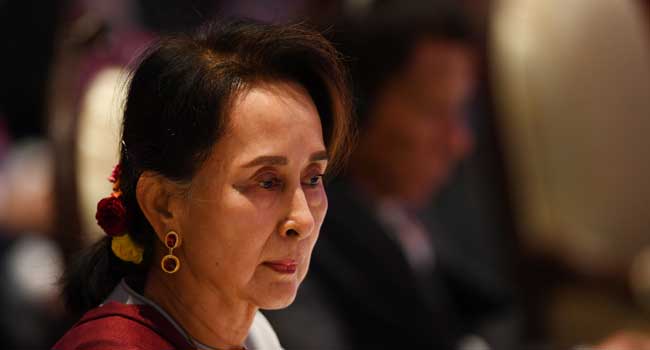Myanmar’s Suu Kyi In Good Health, Says Lawyer

![]()
Myanmar’s ousted civilian leader Aung San Suu Kyi appears in good health despite two months of detention, her legal team said Wednesday as diplomatic pressure on the military junta ramped up.
Daily protests demanding the restoration of the elected government have been met with a crackdown that has left more than 520 civilians dead in the weeks since the February 1 coup.
The junta’s violent response has triggered international condemnation — and threats of retaliation from some of Myanmar’s myriad ethnic armed groups.
The US State Department ordered the departure of non-essential diplomatic staff and their families from Myanmar, and Japan — a top donor to the country — halted new aid payments.
The 75-year-old Suu Kyi has not been seen in public since she was deposed by the military and detained in the early hours of February 1.
But a member of her legal team, Min Min Soe, was summoned to a police station in the capital Naypyidaw for a video meeting with her on Wednesday.
READ ALSO: Biden To Unveil $2 Trillion ‘Once-In-A-Century’ Infrastructure Plan
Suu Kyi is facing a raft of criminal charges and conviction could see her barred from political office for life.
“The physical situation of DASSK (Suu Kyi) seemed good according to her appearance on video screen,” her legal team said in a statement.
Suu Kyi noted that during the meeting, police officers remained at the lawyer’s side, and guards monitored her at her end, the statement said, adding that the Nobel laureate had asked whether this was legal.
She faces a court hearing on Thursday, though another of her lawyers, Khin Maung Zaw, said it was likely to be fairly brief and deal with administrative matters.
The junta is also probing Suu Kyi over allegations she took payments of gold and $600,000 in cash, but Khin Maung Zaw said these were not likely to become formal charges at this stage.
— Japan cuts aid —
The US said it had decided to pull its staff out of the country to protect their safety and security.
World powers have repeatedly condemned the violent crackdown on dissent and hit top junta figures with sanctions.
Japan has halted new aid to the country, according to the country’s foreign minister, but stopped short of imposing sanctions.
“What stance is Japan taking in terms of economic assistance? There is no new aid. We are taking this clear position,” Toshimitsu Motegi told parliament on Tuesday
But so far the pressure has not swayed the generals.
Saturday, the annual Armed Forces Day, saw the biggest loss of life so far, with at least 107 people killed.
The spiralling bloodshed has angered some of Myanmar’s 20 or so armed ethnic groups, who control large areas of territory mostly in border regions.
Three of them — the Ta’ang National Liberation Army (TNLA), the Myanmar Nationalities Democratic Alliance Army and the Arakan Army — on Tuesday threatened to join protesters’ fight unless the military reined in its violence.
Brigadier General Tar Bhone Kyaw from the TNLA told AFP on Wednesday that they were mulling whether to end their ceasefire with the military, which he accused of “war crimes”.
While the trio has yet to act on their warning, two other outfits — the Karen National Union (KNU) and the Kachin Independence Army (KIA) — have stepped up attacks on military and police in recent days.
A police station in Bago was reportedly hit with a rocket attack that injured five officers on Tuesday, though it was not clear who was responsible.
The KNU, one of the biggest rebel groups, took over an army base in eastern Kayin state at the weekend, prompting the military to respond with air strikes.
Further strikes were launched on Tuesday, but Padoh Saw Taw Nee, the KNU’s head of foreign affairs, said the group would continue its position of “strongly supporting people’s movement against (the) military coup”.
The KNU’s Fifth Brigade on Tuesday condemned the air strikes and warned it had no option but to “confront these serious threats” posed by the military.
— Wounded cross border —
Around 3,000 people fled through the jungle to seek safety across the border in Thailand after the weekend strikes.
Thai authorities say around 2,400 have returned “voluntarily” to Myanmar, and another 200 have also agreed to go back.
Thai police said they had intercepted 10 parcels containing 112 grenades and 6,000 rounds of ammunition in northern Chiang Rai province that had been destined for Myanmar’s notorious border town Tachileik.
The UN Security Council will hold an emergency session on Myanmar on Wednesday, requested by former colonial power Britain.
AFP


